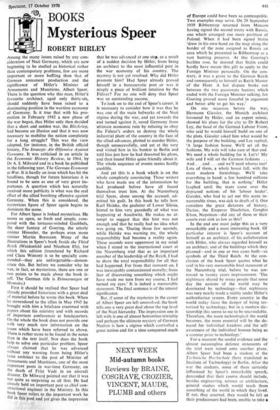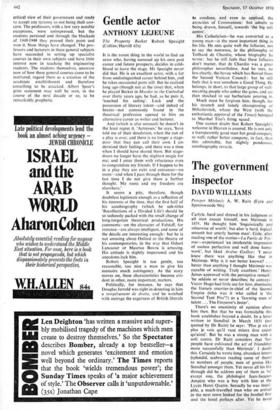BOOKS
Mysterious Speer
ROBERT BIRLEY
Among the many issues raised by any con- sideration of Nazi Germany, which are now beginning to be studied as historical rather than contemporary problems, few are more important or more baffling than that of German armament production and the significance of Hitler's Minister of Armaments and Munitions, Albert Speer. There is the question why this man, Hitler's favourite architect, aged only thirty-six, should suddenly have been raised to a dominating position in the wartime economy of Germany. Is it true that with his pro- motion in February 1942 a new phase of the war began, that Hitler only then decided that a short and sudden war, the Blitzkrieg, had become an illusion and that it was now necessary to mobilise the nation completely for a long struggle? This was the view adopted, for instance, in the British official history, The Strategic Air Offensive Against Germany. It was criticised in an article in the Economic History Review, in 1964, by Dr A. S. Milward and in a book he published in the following year, The German Economy at War. It is hardly an issue which has hit the headlines, though for future historians it is bound to be seen as one of very great im- portance. A question which has naturally received more publicity is what was the real effect of the allied bombing offensive against Germany. When this is considered, the mysterious figure of Speer again begins to dominate the scene.
For Albert Speer is indeed mysterious. He seems so open, so fresh and simple, com- pared with the tortuous-minded Goebbels, the sheer fantasy of Goering, the utterly sinister Himmler, the perhaps even more sinister Martin Bormann. Many of the illustrations in Speer's book Inside the Third Reich (Weidenfeld and Nicolson 85s), for which this edition (translated by Richard and Clara Winton) is to be specially com- mended—they are unforgettable—demon- strate this. But before we consider why he was, in fact, so mysterious, there are one or two points to be made about the book it- self. The German title is Erinnerungen or Memoirs.) First it should be realised that Speer had already provided historians with a great deal of material before he wrote this book. When he surrendered to the allies in May 1945 he brought with him a briefcase crammed with papers about his ministry and with records of important conferences at headquarters. On the whole the book does not provide one with very much new information on the issues which have- been referred to above. There is rather more to be found in the notes than in the text itself. Nor does the book help to solve one particular problem. Speer always claimed that he was advanced without any warning from being Hitler's tame architect to the post of Minister of Armaments and Munitions, one of the most important posts in war-time Germany, on the death of Fritz Vodt in an aircraft disaster. Dr Milward pointed out that it was not quite as surprising as all that. He had already held an important post as chief con- structional engineer in the Ministry. In this book Speer refers to the important work he did in this post and yet gives the impression that he was advanced at one step, as a result of a sudden decision by Hitler, from being an architect to the most influential post in the war economy of his country. The mystery is not yet resolved. Why did Hitler promote him? Had Speer already proved himself in a bureaucratic post or was it simply a piece of brilliant intuition by the Fiihrer? For no one will deny that Speer was an outstanding success.
To look on to the end of Speer's career, it is necessary to consider how it was that he was one of the main bulwarks of the Nazi regime during the war, and yet towards the end turned against it, saved Germany from ultimate economic ruin by refusing to obey the Fiihrer's orders to destroy the whole industrial plant of the country in the face of the allied advances, plotted to murder Hitler, though unsuccessfully, and yet at the very end visited him in his bunker in Berlin and told him just how he had thwarted his plans, and then found Hitler quite friendly about it. The whole sequence of events seems hardly credible.
And yet this is a book which is on the whole completely convincing. Those writers who have made use of the information he had produced before have all found themselves trust him. At the Nuremburg trial Speer, alone among the accused, ad- mitted his guilt. In this book he tells how Karl Heinke, the gauleiter of Lower Silesia, hinted to him very guardedly of what was happening at Auschwitz. He makes no at- tempt to suggest that this hint was not enough and that he really had no idea what was going on. 'During those few seconds, while Heinke was warning me, the whole responsibility had become a reality again. These seconds were uppermost in my mind when I stated to the international court at the Nuremberg trial that as an important member of the leadership of the Reich, I had to share the total responsibility for all that had happened. For from that moment on, I was inescapably contaminated morally; from fear of discovering something which might have made me turn from my course, I had turned my eyes' It is indeed a memorable statement. The final sentence is of the utmost significance.
But, if some of the mysteries in the career of Albert Speer are left unresolved, the book tells one a very great deal about the top level of the Nazi hierarchy. The impression one is left with is one of almost bottomless triviality and perhaps the ultimate mystery of German Nazism is how a regime which controlled a great nation and for a time conquered much of Europe could have been so contemptible. Two examples may serve. On 29 September 1939 Ribbentrop returned from Moscow having signed the second treaty with Russia, one which arranged one more partition of Poland. When it had been signed Stalin 'drew in his own hand on the map along the border of the zone assigned to Russia an area which he presented to Ribbentrop as a vast hunting preserve. At this Goering's hackles rose, he insisted that Stalin could hardly have meant this gift to apply to the Foreign Minister personally. On the con- trary, it was a grant to the German Reich and consequently to himself as Reich Master of the Hunt. A hot dispute broke out between the two passionate hunters which ended with the Foreign Minister sulking, for Goering proved more forceful in argument and better able to get his way.'
On one occasion before the war, Hermann Giessler, the Munich architect favoured by Hitler, and an expert mimic, showed his plans for the city to Dr Robert Ley, the head of the German Labour Front, who said he would himself build on one of the plots. Giessler asked him what would be the purpose of the building, and Ley replied, 'A large fashion house. We'll set all the fashions. My wife will take care of that end. We need a whole building for it. Let's! My wife and I will set the German fashions . . . And ... and ... and we'll need whores too!
Lots of them, a whole house full, with the most modern furnishings. We'll take everything in hand; a few hundred millions for the building, that is nothing.' Hitler laughed until the tears came over the depraved notions of his 'labour leader'.
Giessler, who had to act out this scene in- numerable times, was sick to death of it. One considers the great dictators of history, Darius, the Emperor Diocletian, Genghis Khan, Napoleon—did any of them or their courts ever sink as low as this?
In the end one must judge this as a very remarkable and a most interesting book. Of particular interest is Speer's account of himself as an architect, of his collaboration with Hitler, who always regarded himself as an architect, and of the buildings which they planned—and in one or two cases built—as symbols of the Third Reich. At the con- clusion of the book Speer quotes what he said in his very memorable final statement at the Nuremberg trial, before he was sen- tenced to twenty years imprisonment. 'The nightmare shared by many people that some day the nations of the world may be dominated by technology—that nightmare was very nearly made a reality under Hitler's authoritarian system. Every country in the world today faces the danger of being ter- rorised by technology; but in a modern dic- tatorship this seems to me to be unavoidable.
Therefore, the more technological the world becomes, the more essential will be the de- mand for individual freedom and the self- awareness of the individual human being as a counter poise to technology.'
For a moment the sordid evidence and the almost meaningless defence statements of the trial were raised onto another plane.
Albert Speer had been a student at the Technische Hochschule (here translated as Institute of Technology) in Berlin. After the war the students, some of them certainly influenced by Speer's remarkable speech, demanded that their course should include, besides engineering, science or architecture, general studies which would teach them something of the world in which they lived. If not, they asserted, they would be left as their predecessors had been, unable to take a
critical view of their government and ready to accept any tyranny as not being their con- cern. The professors, with a few very notable exceptions, were unimpressed, but the students persisted and through the blockade of 1948-1949 they pressed their point and won it. Now things have changed. The pro- fessors and lecturers in these general subjects have succeeded in setting up specialist courses in their own subjects and have little interest now in teaching the engineering students. The students themselves, unaware now of how these general courses came to. be instituted, regard them as a creation of the acade9xic establishment and therefore something to be attacked. Albert Speer's grim statement may well be seen, in the course of the next decade or so, to be remarkably prophetic.







































 Previous page
Previous page